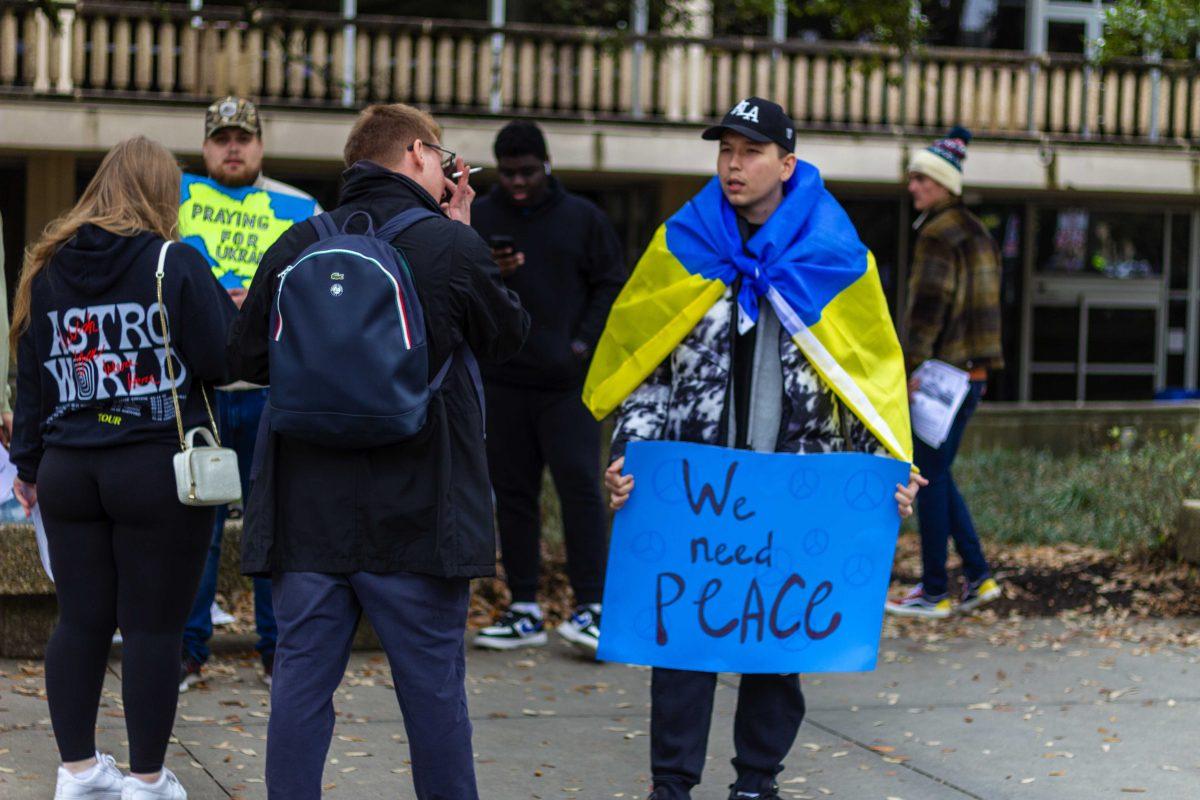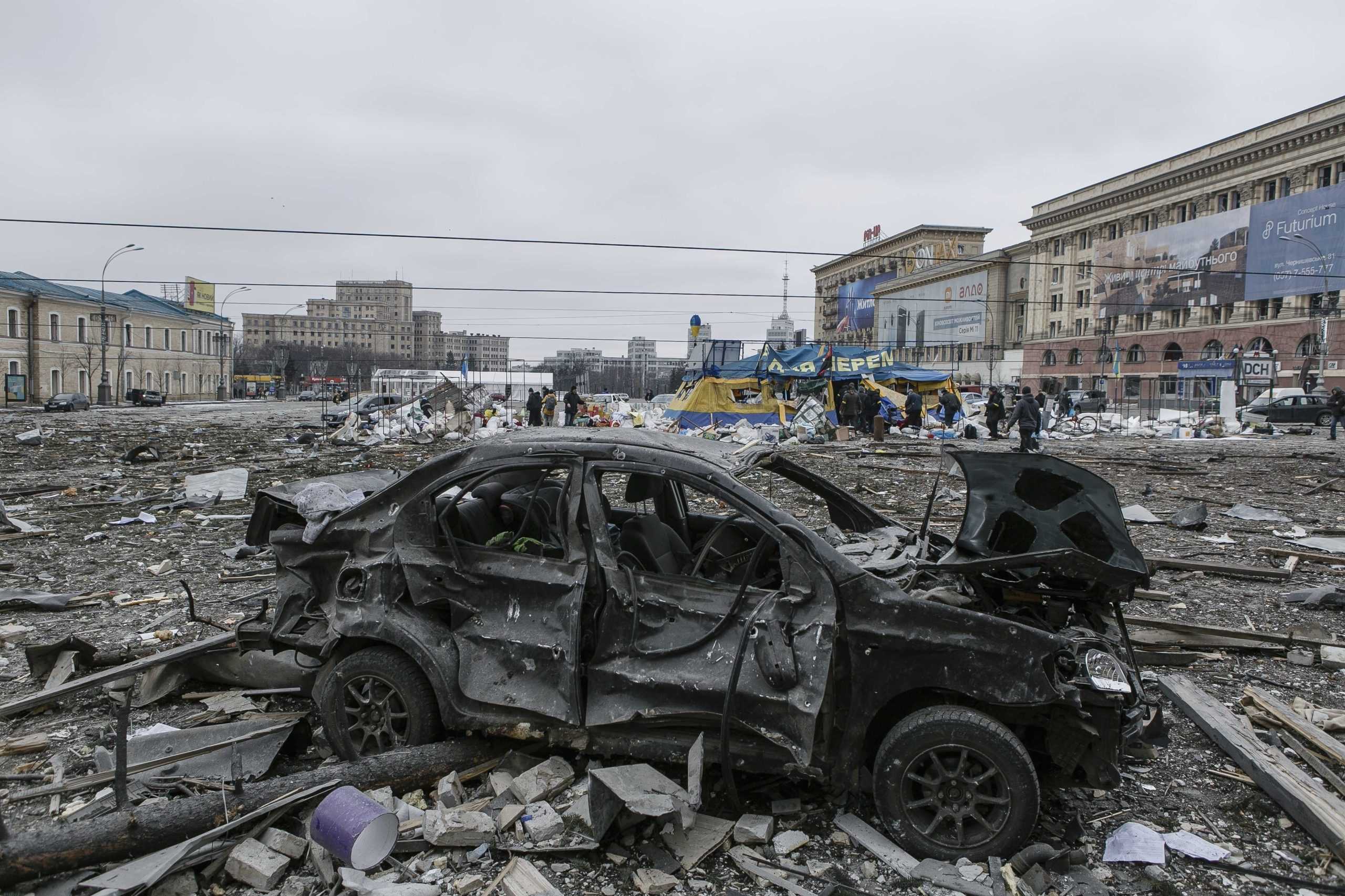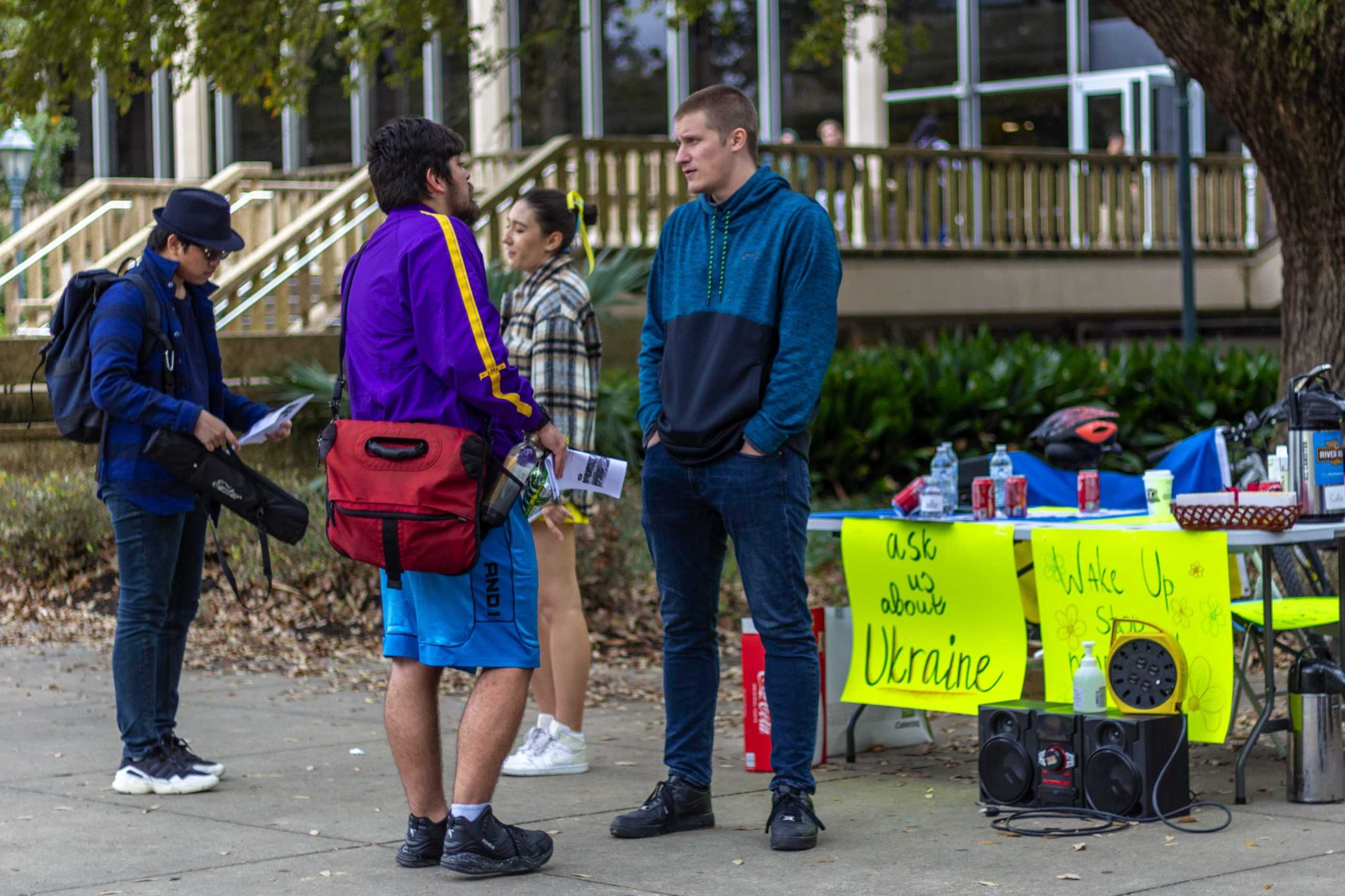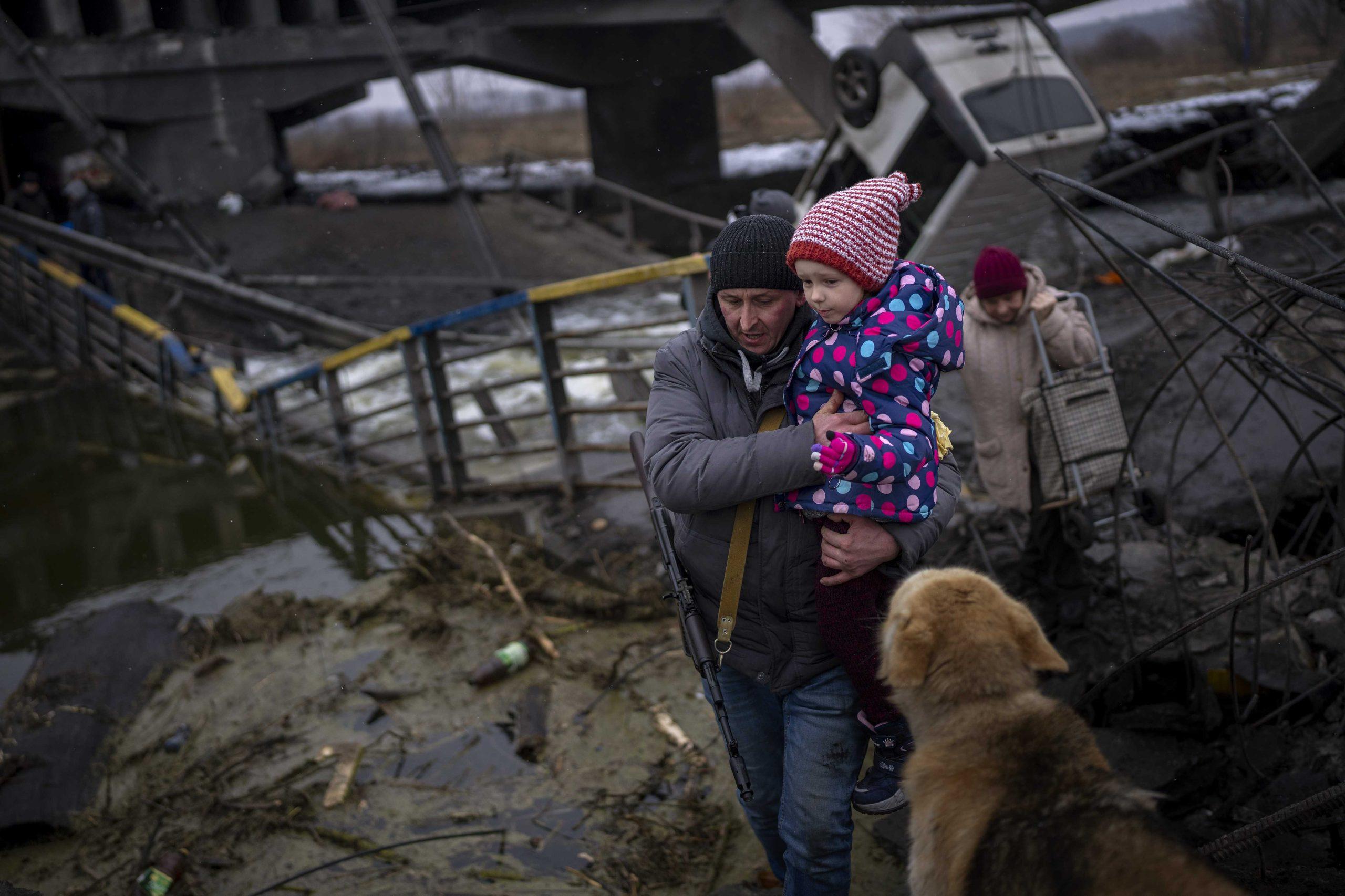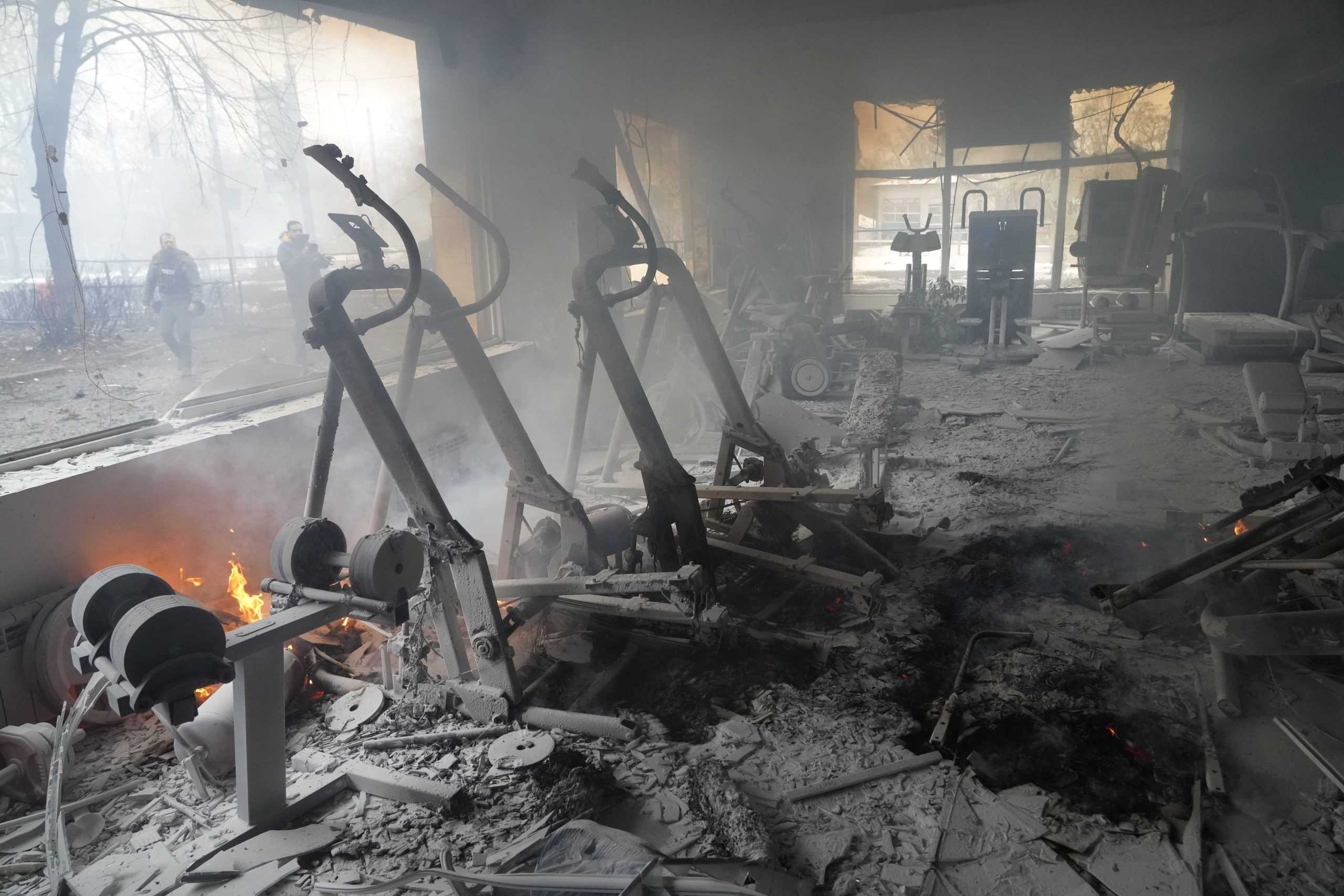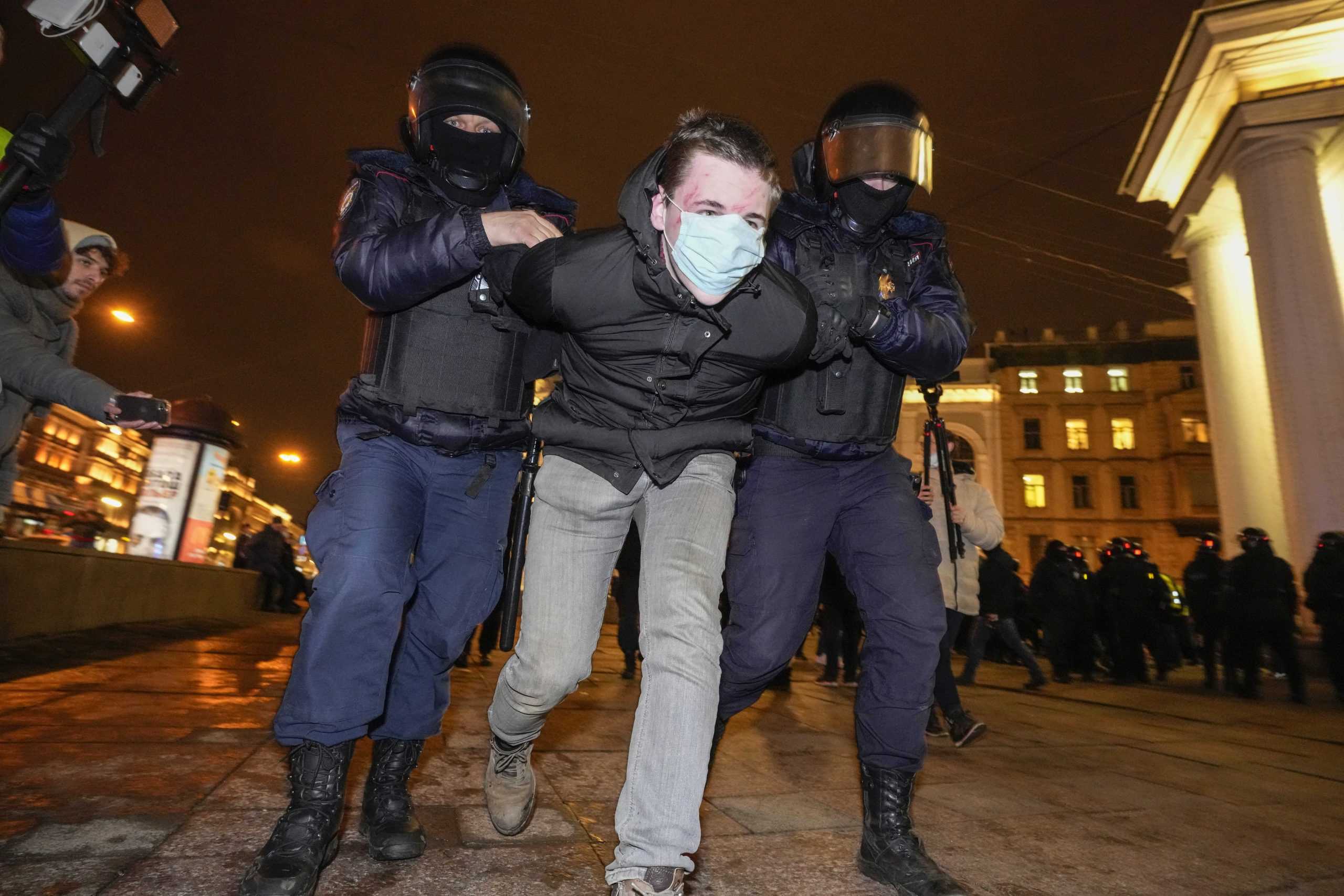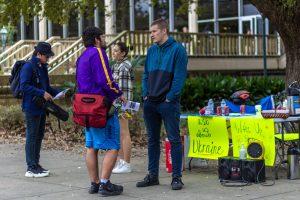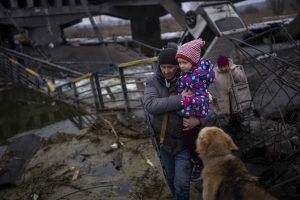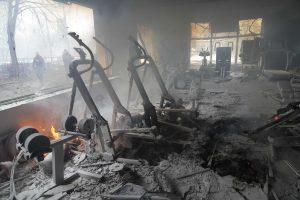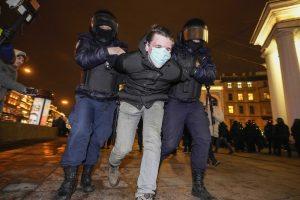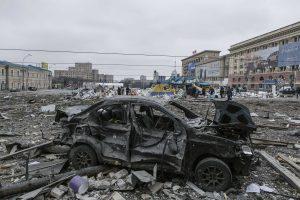As fighting between Russian and Ukrainian forces makes its way into the country’s capital of Kyiv, Ukrainian and Russian LSU students condemned the unprovoked act of war.
“It’s been reported that several rockets have been shot just a few kilometers from my house,” said Violetta Kovalenko, an LSU studio arts student from Ukraine. ”It’s just really scary, dangerous what’s going on right now.”
Other than her father who is a police officer, Kovalenko’s family has evacuated Kyiv and moved to the countryside. So far, she has been able to maintain communication with her family.
Kovalenko was among several international students tabeling in Free Speech Alley Friday to bring awareness and educate students about Russia’s ongoing invasion of Ukraine. Russian and Ukrainian forces are reported to be fighting in the streets of the country’s capital, Kyiv.
Following months of Russian troop build-up along the Russia-Ukraine border, Russian forces on Thursday began an air and land assault on Ukraine. The unprovoked act of war has been widely condemned by almost every country and international protests against the war, including in Russia, have erupted.
Daria Antonovskaya, a biochemistry freshman from Ukraine, said she’s concerned that LSU students and other young people plugged into social media are vulnerable to Russian disinformation surrounding the war.
“The Russian president said that he is going to free Ukraine from nationalists, and that Ukraine is suffering from a nationalist movement from Nazis,” Antonovskaya said. “It’s crazy. Literally our president, he has Jewish roots.”
Russian officials and state-funded media outlets have made several false claims to justify their invasion of Ukraine. Russia has said its assault on Ukraine is aimed only at military targets, but bridges, schools and residential neighborhoods have been hit since the invasion began Thursday, according to the Associated Press.
Since Thursday, 198 people, including three children, have been killed and 1,000 more wounded, Ukraine’s health minister reported Saturday.
Ecological restoration freshman Kirill Rozhentsev is from Russia and has family there. He said the war is pointless and has no justification.
“I’m very ashamed. I’m ashamed of my president. I’m scared,” Rozhentsev said.
He said that in more educated regions like St. Petersburg and Moscow, people don’t support the war but many fear what will happen to them by the authorities for speaking against it. Anti-war protests have erupted across Moscow and other parts of Russia since the invasion, with many protestors being arrested.
Over 1,700 Russian anti-war protesters in Moscow were arrested Thursday, according to Axios.
“My dad might lose his job. My dad can’t even send me money because the banks are under sanctions,” Rozhentsev said. “Oh god, I don’t know if I’ll be able to continue studying at LSU because the currency rates are going up. The situation in Ukraine is much worse. There’s no need to feel pity for me. We will have to pay for it.”
The U.S. and several other nations have imposed sanctions on Russia in response to the invasion, including some that directly target Putin and Russian oligarchs. Russia’s currency, the Ruble, is currently the weakest it has ever been. More than one-third of Russia’s banking assets have been cut off.
Oleg Grushetskiy is a Ukrainian and a senior at LSU studying agricultural business who hopes the international community will take further action on Russia.
He says that the war is not only unpopular with many of the Russian people, but also within the Russian military. He describes accounts of soldiers getting tricked and being told they are going on training exercises and ending up in Ukraine.
“Most of the soldiers are dependents; since they were born in 2001, 2002, 2003: 18 and 19 years old,” Grushetskiy said.
Back home, Grushetskiy says that everyone is angry and preparing for the worst.
“In my town they had a community meeting today. My dad went and they found that there may be problems with the supply of bread,” Grushetskiy said. “But no one wants to give up.”
‘Compel through Pain’
LSU International relations professor David Sobek says that this conflict has been incubating since the collapse of the Soviet Union and the progressive movement of the North Atlantic Treaty Organization’s border toward Russia’s.
After the inclusion of Latvia, Lithuania and Estonia, NATO shared a distinct border with Russia. Sobek says that in recent years, Ukraine had been drifting toward the West’s sphere of influence and away from Russia.
“Ukraine leaving the orbit of Russia permanently is something I think, in [Putin’s] mind, he’s unable to accept,” Sobek said. “The military advantage he has over there is only probably going to decrease over time. So, Ukraine’s Army is getting more modern and getting better equipment. It was either now or just accept that Ukraine is going to fall to the Western sphere of influence, just like Latvia, Lithuania or Estonia.”
Although Russia’s goal through war is to push Ukraine farther from the West, Sobek believes it will only result in them wanting to get closer. Russian motivation likely includes the removal of Western influence, but ideally, could include the installation of a Ukrainian puppet government.
“This is a strategy of compellent,” Sobek said. “They want to compel the Ukrainians to change the political system and you only compel through pain.”
In terms of Western involvement in the war, Sobek imagines it will not come from direct fighting.
“It’s going to be sanctions. It’s going to be moving forces to the NATO allies who are bordering Russia and bordering Ukraine just to reassure them that they’re not next,” Sobek said. “That’s going to be the extent. Ukraine has asked for NATO to enforce a no-fly zone over Ukraine.
That’s not happening. NATO’s not going to send forces to confront the Russians. So it’s going to be, moving forward, moving forces to reassure allies that we’re there for them and then it’s going to be the cost of really imposing the sanctions.”
Putin says that any threats to the Russian efforts or their people would be met with immediate action, “and lead to consequences that you’ve never faced in your history.”
Sobek and much of the internal community interprets this as a nuclear threat to NATO, if they are to move toward intervention. President Joe Biden has ensured the U.S. military will not engage the Russians.
History sophomore Jonah Black believes that Russian aggression is the fault of Putin and that “he’s a power-hungry warmonger, an authoritarian.”
“Putin is like a relic of the Soviet Union,” said Colby Billiot, an international studies freshman. He’s wanting to bring back that power, that kind of influence the Soviets had. He would be foolish to go anywhere else in eastern Europe.”
Javier Calderón is a political science junior who isn’t sure what Russia’s end goal from this conflict is—he can’t determine what Putin really wants out of Ukraine.
“I’m not an expert, obviously, but it seems like nobody knows. It seems that only Putin knows, not even his close advisers,” Calderón said.
On sanctions, economics and political science junior Rehm Maham supports the notion of sanctions, while Cooper Ferguson, a sophomore studying international trade and finance, dislikes them.
Maham believes that sanctions can deprive the Russian war effort of the capital required to fund it. He acknowledges the collateral damage that can be inflicted when the entire economy of a country is targeted.
“When you have a reckless maniac running a country, threatening the sovereignty of nations that he said he will uphold the sovereignty of, you don’t have much of a choice with how you respond, Maham said. “Short of boots on the ground, I think the U.S. should do everything it can to cut Russia off from the international financial system.”
Ferguson believes that sanctions, even while targeted at a country’s military, will inevitably affect the lives of civilians and lead to their suffering.
“I believe that everywhere we’ve tried sanctions in the last 30 years have been wholly ineffective in actually trying to sway these repressive regimes,” Ferguson said. “The entire idea of a repressive regimes is that they don’t respond to their citizens, and they don’t respond to the suffering of their citizens.”
Black, Billiot, Calderón, Maham and Ferguson all agree that it’s good the U.S. isn’t directly intervening in Ukraine.
“It’s smart for us not to get involved; I do stand with the Ukrainian people that they deserve their own country and deserve to be independent. But it’s not worth it for us to throw ourselves into another war. If Russia finds out that military personnel was sent, then that alone is a declaration of war,” Black said.
Maham and Ferguson believe that the invasion of Ukraine illustrates the diplomatic ineffectiveness of the United Nations. Maham describes a “terribly designed institution” where five countries—three liberal democracies and two authoritarian dictatorships—have binding powers on global affairs.
“[Russia] is currently the president of the UN Security Council and was chairing the meeting last night that was occurring while Russia invaded Ukraine? Russia. Russia was chairing a meeting about the invasion they started during the meeting to try and stop them from invading,” Maham said.
Unless Russian forces were to cross the border of a NATO country, Black, Billiot, Calderón, Maham and Ferguson believe that the U.S. won’t get physically involved in the conflict. All of them hope that the world gives humanitarian aid and resources to the suffering people in Ukraine.


